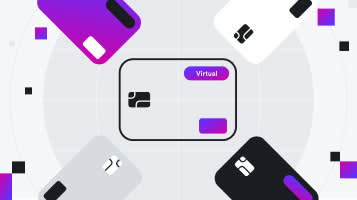Single-use virtual cards: A game-changer for travel agents

Online travel agents, or OTAs, face complex challenges when it comes to payments and financial management, and many are not yet taking advantage of modern, global solutions that could cut through this complexity. At the same time, our research with Skift revealed that 90% of travel executives are prioritising upgrades to payment and financial operations systems, so it counts to stay ahead of your peers.
As a travel agent, you may face a high volume of international payments, which means exposure to FX risk and transaction fees. Bookings with multiple components create problems in tracking and reconciling payments. The likelihood of cancellations and delayed payments is also high compared with other industries, and there are international financial regulations to consider. All this can lead to lost time and decreased profit margins.
One tool that can transform the finances of online travel agents is the single-use virtual card. A single API integration can empower travel agency teams to pay global suppliers in seconds with automated issuing, increased security and improved financial management. Below, we’ll explain how single-use virtual cards work and how they can benefit your business.
What are single-use virtual cards?
A single-use virtual card is a digital payment card that is generated for a specific online transaction. It is usually limited to a fixed amount of funds and can only be used once. Typically, its spending limit will match the exact amount of the item to be purchased, and will be valid only for a short period of time. Like credit cards, single-use virtual cards also consist of a unique card number, expiration date, and CVV code, and are accessed through a digital platform or app.
These features are particularly useful if you’re a travel agent who books and manages flights, accommodation, transport, and activities for your clients. They allow you to better track and manage your business’ expenses.
In summary:
What is a single-use virtual card? Single-use virtual cards are electronic cards with no physical form. They consist of unique card details that can be used online: card number, expiry date, and CVV code. They can only be used for a single transaction.
How do single-use virtual cards work? Single-use virtual cards can be created instantly via a digital app or platform for a specific transaction, such as booking a client’s flights or accommodation. They expire once this payment is completed.
How do you get a single-use virtual card? Single-use virtual cards can be created online through banks and other financial institutions, such as Airwallex.
Are single-use virtual cards safe? Single-use virtual cards are very secure. Because each virtual card is generated for a single transaction and can only be used once, it is very difficult for fraudsters to intercept and misuse the card information.
Transform your financial operations.
How can travel agents use single-use virtual cards?
Online travel agencies can use API integrations to automatically generate single-use virtual cards when customers make a booking. These payments can then happen instantly, or at a later date automatically rather than you having to manually make payments. This is especially useful if the customer’s transaction to your business involves you making payments to multiple vendors for different services, such as accommodation, flights, and experiences at various points in time.
This setup can improve your spend management. For example:
If a customer cancels part of a booking, such as a walking tour, the vendor can refund that portion back to the corresponding single-use virtual card.
If a customer requires a deferred payment between booking a hotel and checking in, the single-use virtual card can be programmed to be billed only at the check-in date.
How do single-use virtual cards work?
Your customer makes a booking and pays you in their preferred currency and payment method – you accept and hold the funds in a multi-currency account, such as an Airwallex Global Account.
With an issuing API integration, your system will automatically request a single-use virtual card for the relevant amount for each item in the booking.
The primary account number (PAN) for this virtual card will be instantly sent back to your system.
These virtual card details will be pushed out to reserve the customer’s booking with the supplier (for example, a hotel).
This supplier processes the card transaction. This could happen later, for example, when the customer checks into their hotel.
The transaction is processed.
Benefits of single-use virtual cards for travel agents
Single-use virtual cards can simplify complex travel bookings
While customers may make a single payment to your OTA for a package containing, for instance, flights, hotels, activities, and insurance, your OTA needs to pay each vendor separately. With single-use virtual cards, your platform can programmatically generate cards for each of the components in the transaction associated with that specific customer.
Single-use cards can streamline cancellations and refunds. Each virtual card is linked to a customer profile through metadata, such as the customer’s booking ID. This setup means that payments can be easily tracked back to the customer if they request a refund.
Single-use virtual cards also simplify deferred payments. For example, the virtual card can be used to guarantee a hotel booking for a customer, but it’s only later, when the customer checks in, that the hotel’s system bills the card for payment.
Single-use virtual cards can improve security
Single-use credit cards can only perform a single transaction, reducing the risk of fraud.
If you suspect fraud, you can freeze or cancel the card without impacting the primary account.
You can set transaction limits to avoid unauthorised spending and further reduce the likelihood of fraud.
You can also limit transactions to a certain type of merchant.
Single-use virtual cards simplify record-keeping and reconciliation
Many virtual cards can be linked to one business account, so you can access all transactions from a single dashboard
Some providers, like Airwallex, offer expense management features and accounting software integrations with their virtual cards, streamlining cash flow and reconciliation.
Single-use cards can cut costs and boost revenue
Some single-use virtual cards, like Airwallex’s, enable multi-currency payments that help businesses avoid foreign transaction fees. Holding multiple currencies means that you can receive payments in the currency of international customers and pay vendors from held balances in their currencies, all without wasting money on FX fees.
You can even earn additional revenue through cashback rewards on each booking.
Transform your financial operations with Airwallex’s single-use virtual cards
Many online travel agencies have to deal with fragmented and complex payments, financial risk, and cancellations on a daily basis. Airwallex’s Issuing API can help take the sting out of these processes by streamlining vendor payments and simplifying financial management, while boosting payment security.
Get automated global card issuing at scale to pay global suppliers in seconds, while staying in control of all purchases in real time.
Save on FX fees with multiple settlement currencies and pay 0% international card transaction fees
Control your cards with limits and Remote Authorisation, and instantly cancel or freeze them.
Access built-in global compliance and advanced security measures.
Our end-to-end financial platform, Airwallex, offers transfers and expense management as well as card issuance, and Global Accounts, all from a single dashboard. It can help your business scale globally while remaining secure and efficient.
Transform your financial operations.
Share

David manages the content for Airwallex. He specialises in content that helps EMEA businesses navigate global and local payments and banking.
View this article in another region:AustraliaCanada - EnglishCanada - undefinedNew ZealandSingaporeUnited StatesGlobal
Related Posts
Foreign transaction fees and how to avoid them
•8 min

